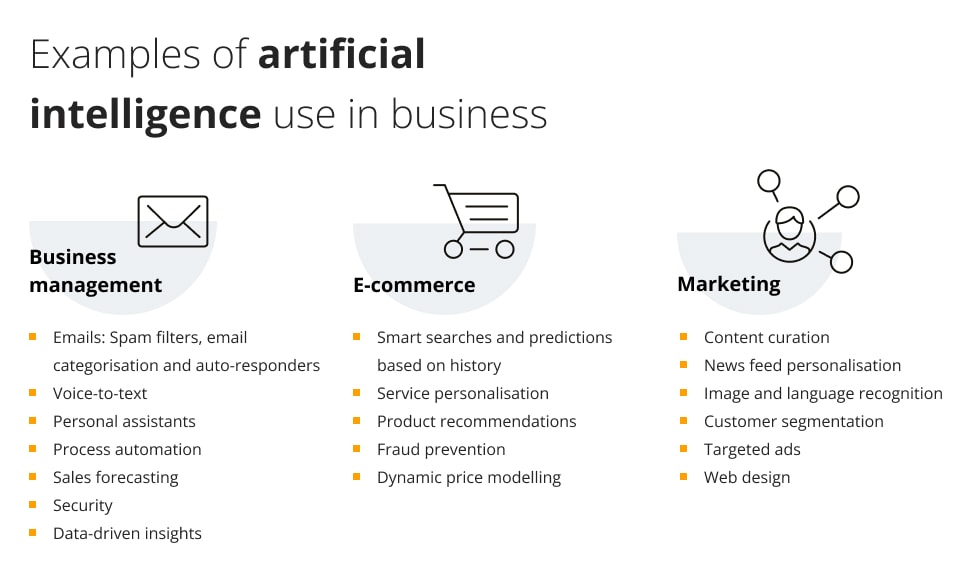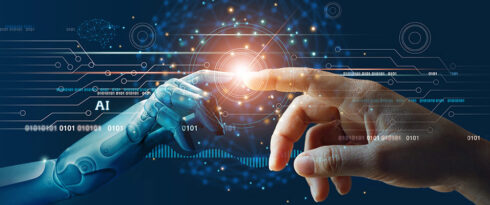
How Artificial Intelligence will change the future
AI (Artificial Intelligence) has revolutionised our lives in numerous ways over the last few decades. It impacts on what we buy, where we travel, what films or TV shows we watch, which music we listen to and, most importantly, the way we work.
The ability of a digital computer or computer-controlled robot to perform tasks commonly associated with intelligent beings.Artificial intelligencehttps://www.britannica.com/technology/artificial-intelligence
AI is transforming the way we work across almost every industry. Marketing, business, finance, tech, healthcare and many other sectors are now intertwined with AI technology. It is helping to shape the way we carry out complex tasks, how we manage our systems, and how we integrate our networks across the globe. Understanding the importance, application and presence of AI is crucial, as it will propel us into the future.
The future of AI in the workplace
Smart technologies are already a deeply ingrained feature of our lives, not only in the cutting-edge tech world, but also across all areas of work, commerce, and even our homes. AI systems are revamping many processes of service and production, redesigning the entire framework of many key industries around the world and transforming our economy.
The effects of AI are far-reaching; smart appliances in our homes, AI-based virtual assistants, chatbots, financial prediction models, social media, online shopping and manufacturing are all examples of AI-driven activities.
According to a 2021 report by McKinsey, AI adoption continues to grow, and the benefits are significant. The results of their survey indicated that 56% of all respondents claim to use AI-driven technology for at least one key operation in their business. This is not only limited to the Western world; 57% of respondents from China, Africa and the Middle East also report adopting AI, with the largest growth being seen in India.
This growth is forecasted to continue, according to PwC’s Global CEO Survey, which has predicted that digitisation and automation goals are a key aspect of 54% of companies’ long-term corporate strategies.
The utility, reach and application of AI systems is undeniable, so we can only expect the future of AI to be extremely strong. Applied correctly, and with the relevant oversight and regulation, artificial intelligence in the workplace will be (and already is) extremely important, and can only be expected to be more and more prevalent as we move into the future. The key is understanding how we can harness this deep-learning technology to serve our operations successfully.
Examples of AI in the workplace today
Artificial intelligence in the workplace is all around us. Our phones, Google Assistant, Alexa and Siri are all widely adopted AI applications that we use every day. Other examples include chatbots and virtual assistants, web search engines, job applications that are screened through AI tech, weather prediction models, and smart technology used in modern cars.
In manufacturing, AI is used to optimise the product development process to find ways of improving the company’s processes, materials and operations. It can be applied to automate maintenance, repairs and replacement of machinery, as well as the physical manufacturing of the products themselves.
In healthcare, AI is used to help diagnose illnesses such as cancer with a much higher success rate than a human radiologist could. Artificial intelligence is widely used by pharmaceutical companies to accelerate the drug discovery process and help treat patients more effectively through cutting-edge medical trials.
Chatbots have revolutionised the way that companies interact with their customers in the digital world. They are able to decode both spoken and written language by using natural language processing and provide almost instantaneous and accurate responses. Not only are they essential in reducing costs and driving efficiency, AI chatbots can also be used by the employees themselves, as they can act as virtual team members and assist staff in managing their schedules, prioritising tasks, completing IT operations and even conducting meetings.
Artificial intelligence is also helping us to reduce emissions by creating more energy-efficient buildings and infrastructure. According to the US Department of Energy, commercial buildings waste up to 30% of the energy they use, so AI can be utilised to help reduce this waste in the pursuit of a more eco-friendly approach. IoT sensors and AI technology are offering companies smarter energy management platforms, which help to anticipate peak energy usage and redistribute systems accordingly.
There are countless applications of AI in the current workplace – far too many to mention in one article. Have a look at some other applications of AI technology in business below:
Benefits of AI in the workplace
There are almost countless benefits to adopting AI in the workplace. Have a look at some of the most important advantages below.
Reducing human error
Human errors are a part of being human. Mistakes happen no matter how much care, attention and quality control is applied. With all the best will in the world, this is unavoidable. Even a single small error can have massive consequences, as the UK-based company Argos can well understand. In 2005, an error in one of their listings for a television that was supposed to retail at £349.99, actually listed it for 49p for around 7 hours. Thousands of orders were placed, and although Argos managed to reject them, they ultimately faced a lengthy legal battle so as not to shell out thousands of TVs for less than the cost of a bar of chocolate.
AI helps to eliminate such errors with a very strong success rate. It is designed to flag inconsistencies before they go live, and can ultimately save companies millions in potential costs. It helps to avoid production damages, faulty equipment and revenue forecast errors.
Reducing human workloads
As AI can cover a lot of the “heavy lifting” for companies, human employees subsequently have more time to focus on other tasks. Labour-intensive duties such as customer service and sales can be done using chatbots, who provide swift and accurate responses to customers. This reduces the number of call centre and technical support staff that are needed by companies, allowing them to focus on management, growth and expansion. AI can help businesses with repetitive and menial tasks, leaving employees free to work on key areas of the business.
Increased efficiency and accuracy
AI allows companies to work more efficiently by helping them to complete tasks more quickly and accurately. Human error is reduced through the use of AI tools, leading to faster and more effective operations. This is particularly useful when working with data (such as in finance or engineering), where a human would need to spend significantly more time processing the numbers and information than an AI-powered tool would. This hyper-efficiency not only saves on costs, but protects companies from suffering embarrassing mistakes that could harm their brand.
Increased productivity
Humans need breaks; they get tired, they procrastinate, and their concentration is hard to maintain over long periods of time. Artificial intelligence does not get tired. It does not need a coffee break, and it does not complain about working overtime. It can operate 24 hours a day, 365 days a year, and it won’t miss a beat. This drives productivity, which leads to increased revenue. AI-powered software can be assigned tedious and repetitive tasks and perform them perfectly every time. Overseen by human intelligence, an AI workforce is a massive attribute to businesses around the world.
Summary
Artificial intelligence is here and it’s not going anywhere. It’s taken a few knocks since its introduction in the last few decades, with many predicting the mass layoff of the human workforce and even going so far as to expect some form of Skynet-terminator disaster to occur as a result.
However, with careful oversight and regulation, AI can be, and already is, one of the most effective tools at our disposal. It will continue to grow, develop and be integrated into business, health and personal lives for years to come. Understanding its potential is the key to moving into a better future.





